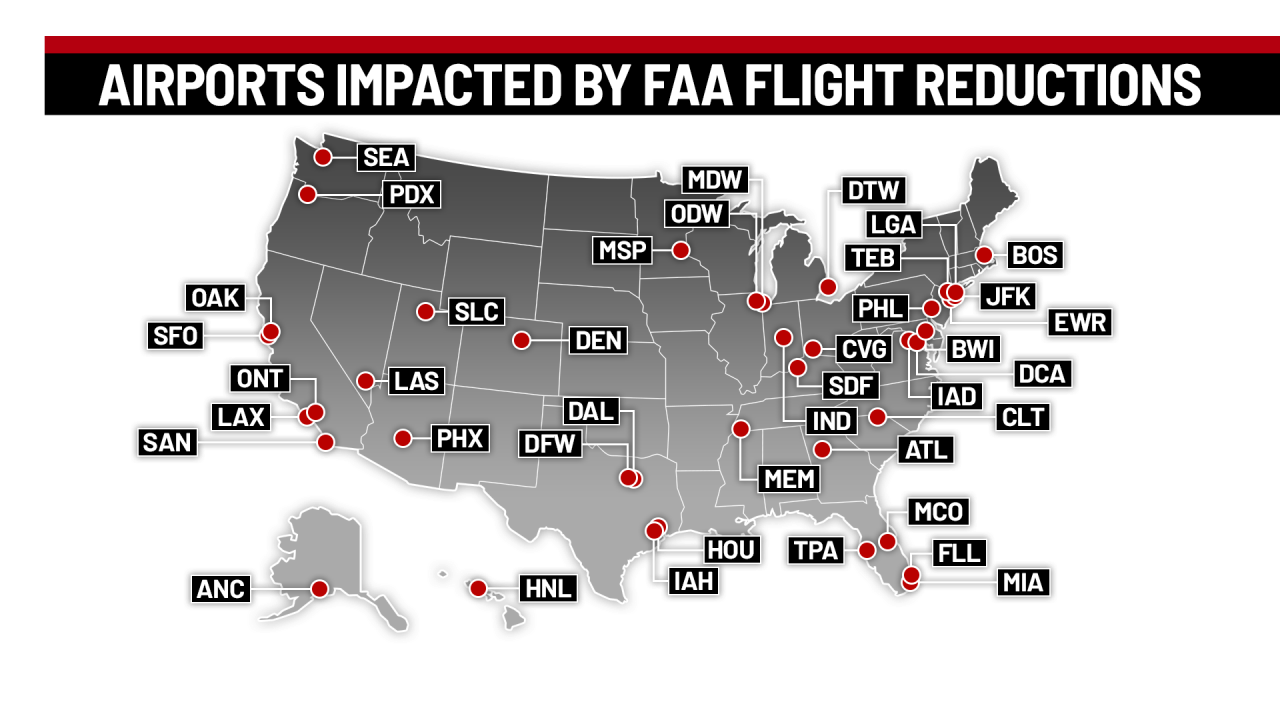Government Shutdown & Flight Reductions — What Travelers Need to Know
As the U.S. federal government shutdown continues, its effects are rippling through the aviation system. Most recently, the Federal Aviation Administration (FAA) has announced a phased 10 % reduction in flights at 40 major U.S. airports, due to mounting strain on air-traffic controllers and other essential staff working without pay.
What’s the 10 % cut about?
The FAA issued an emergency order that, starting Friday (from the date of the announcement), domestic flights at 40 high-volume markets will be reduced: 4 % first, 7% as of November 7 and then gradually increasing to 10 % by Nov. 14.
International flights are initially exempt.
The move is a proactive safety step: controllers are working unpaid, and agencies warn of “system stress”.
Major airports named include: Hartsfield–Jackson Atlanta International Airport (ATL), Chicago O’Hare International Airport (ORD), Dallas/Fort Worth International Airport (DFW), Los Angeles International Airport (LAX), John F. Kennedy International Airport (JFK) among others.
What travelers can do to plan ahead
Given the reduction in flight capacity and the ongoing shutdown impacts, here are steps passengers should take:
Check your flight status frequently — use your airline’s app and confirm with both departure and arrival airports.
Arrive early — With staffing shortages possible (TSA, ATC), security and boarding may take longer.
Plan for connections carefully — With fewer flights and potential delays, tight connections pose higher risk of disruption.
Book morning or less busy flights — Earlier departures may be less impacted by cascading delays.
Have contingency plans — If your itinerary is critical, consider flexible tickets or alternatives in case a flight is canceled.
Know your rights — In the U.S., if your flight is canceled, you’re entitled to a cash refund for the unused portion of your ticket.
Stay updated on airport-specific news — Some airports may announce individual restrictions or advisories.
How travel insurance can help
From IMG:
“Our carriers have provided the following guidance: IMG’s Travel Protection Plans that include travel insurance underwritten by United States Fire Insurance Company or Sirius Point may provide benefits that can be triggered by the U.S. Government shutdown. Coverage can vary by State, so you should review your plan document for possible benefits under Trip Cancellation, Trip Interruption, Missed Connection, or Trip Delay as these coverages may provide protection for losses resulting in certain circumstances. Since this event is no longer unforeseen, policies issued on or after October 1, 2025 will not cover this event.”
Important: We Recommend Contacting Your Insurer Directly
Because these are unprecedented circumstances, and because exact wording in each travel insurance policy can vary widely, we strongly urge you to reach out directly to your policy carrier or plan administrator rather than relying solely on third-party summaries. The event of a U.S. government shutdown may be addressed differently in each policy—some may not reference it explicitly, some may treat it as a known event, others may exclude it. We are not the insurer; we’re providing guidance based on available information. For definitive answers, your policy documentation and the carrier’s instructions are the best source.
What this means for you:
If you purchased your travel insurance policy before October 1, 2025, you may still have coverage for disruptions triggered by the shutdown (depending on your state and plan terms).
If your policy was issued on or after October 1, 2025, the shutdown is considered a known event and your plan will not cover losses related to it.
Carefully review your plan document and speak with your insurer or broker to determine if your specific policy includes benefits like Trip Cancellation, Trip Interruption, Missed Connection, or Trip Delay in this scenario.
Keep documentation: delays, cancellations, additional expenses, proof of policies and purchases are important in making a claim.
Key takeaways
The FAA’s 10 % flight reduction across major airports marks a significant travel disruption risk if the shutdown persists.
Travelers should act proactively: check flights, build buffer time, remain flexible.
Having travel insurance issued before Oct 1, 2025 may provide added protection — but you must check your plan specifics.
This situation underscores the value of reviewing your travel insurance before you book or depart.
Helpful links for travelers
FAA Operations Status Dashboard: FAA Flight Status Map
TSA Wait Time Tracker: MyTSA app or TSA Wait Time Tracker
ABC News overview: How the Government Shutdown Impacts Travel
Business Insider article on the FAA cuts: FAA cutting flights by 10%
Condé Nast Traveler explanation: What Fliers Need to Know
Bottom Line
The skies are still open, but the system is under strain. For all travelers — especially those with upcoming departures — this is a time to stay alert, stay flexible, and make sure your protections (including travel insurance) are in place.

